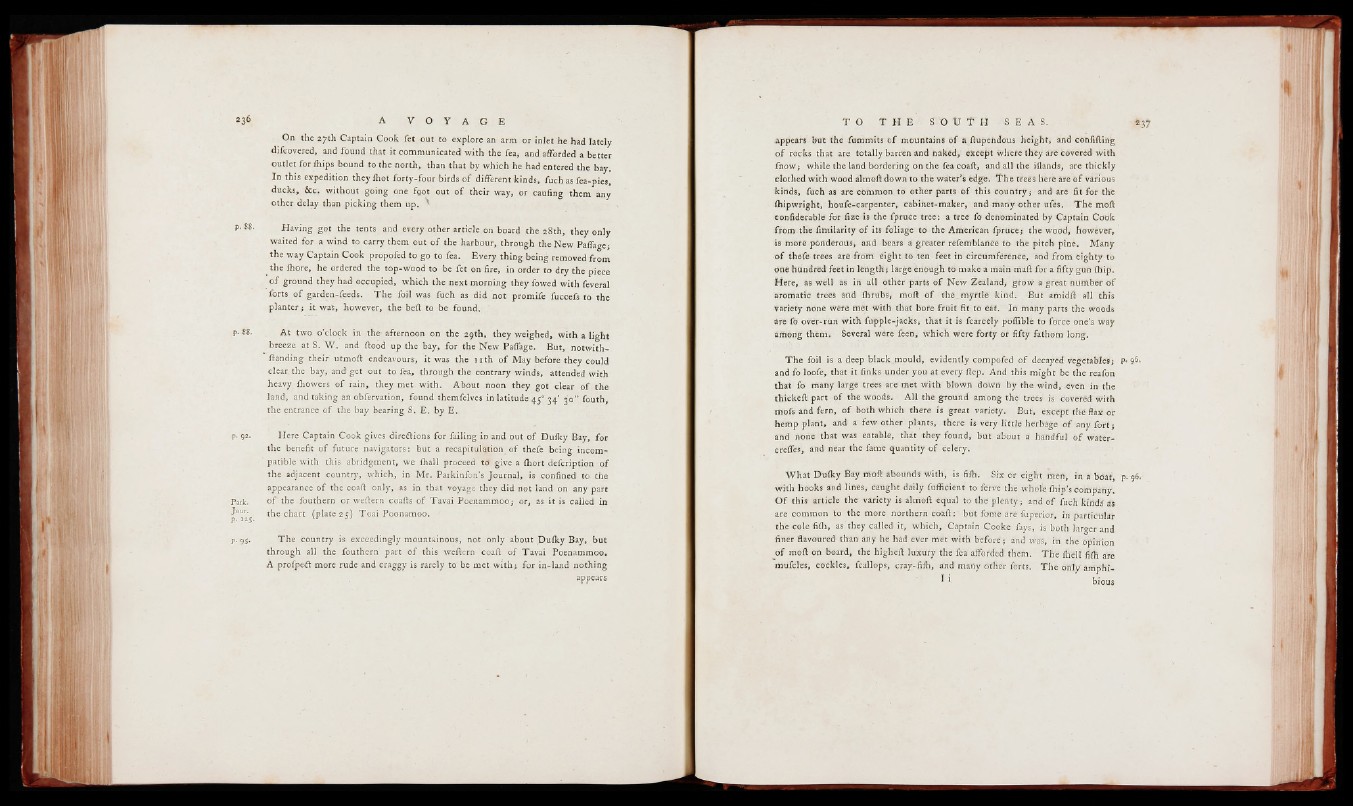
On the 27th Captain Cook fet out to explore an arm or inlet he had lately
difcovered, and found that it communicated with the fea, and afforded a better
outlet for Ihips bound to the north, than that by which he had entered the bay.
In this expedition they ihot forty-four birds of different kinds, fuch as fea-pies,
ducks, &c. without going one fqot out of their way, or caufing them any
other delay than picking them up. ^
p. 88. Having got the tents and every other article on board the 28th, they only
waited for a wind to carry them out of the harbour, through the New Paffage;
the way Captain Cook propofed to go to fea. Every thing being removed from
the fhore, he ordered the top-wood to be fet on fire, in order to dry the piece
o f ground they had occupied, which the next morning they fowed with feveral
forts of garden-feeds. The foil was fuch as did not promife fuccefs to the
planter; it was, however, the beft to be found.
p-88. At two o’clock in the'afternoon on the 29th, they weighed, with a light
breeze at S. W. and ftood up the bay, for the New Paffage. But, notwith-
ftanding their utmoft endeavours, it was the n th of May before they could
clear, the bay, and get out to fea, through the contrary winds, attended with
heavy ihowers of rain, they met with. About noon they got clear of the
land, and taking an obfervation, found themfelves in latitude 450 34’ 30” fouth,
the entrance of the bay bearing S. E. by E.
p. 92. Here Captain Cook gives directions for failing in and out of Duiky Bay, for
the benefit of future navigators: but a recapitulation of thefe being incompatible
with this abridgment, we ihall proceed to give a fhort defcription of
the adjacent country, which, in Mr. Parkinfon’s Journal, is confined to the
appearance of the coaft only, as in that voyage they did not land on any part
Park. of'the fouthern or weftern coafts o f Tavai Poenammod; or* as it is called in
Bias' the chart (plate 25) Toai Poonamoo. -
p. 95. The country is exceedingly mountainous, not only about Duiky Bay, but
through all the fouthern part of this weftern coaft of Tavai Poenammoo.
A profpeCt more rude and craggy is rarely to be met w ith; for in-land nothing
appears
appears but the fummits of mountains Of a ftupehdous height, and confifting
of rocks that are totally barren and naked, except Whefe they are tóveréd with
fnow ; while the land bordering on the fea coaft, and all the iilands, are thickly
clothed with wood almoft down to the water’s edge. The trees here are of various
kinds, fuch as are common to other parts of this Country ; and are fit for the
ihipwright, houfe-carpenter, cabinet-maker, and many other ufes. The moft
confiderable for fize is the fpruce tree: a tree fo denominated by Captain Cook
from the fimilarity of its foliage to the American fpruce; the wood, however,
is more ponderous; and bears a greater refemblartéé tô the pitch pine. Many
o f thefe trees are from eight to ten feet in circumference, and from eighty to
one hundred feet in length ; large enough to make a main maft for a fifty gun ihip.
Here, â9 Well âs in all other parts of New Zealand; grow a great number of
aromatic trees and ihrubs, moft of thé myrtle kind. But amidft all this
variety none were met with that bote fruit fit to éáf. In mahy parts the woods
are fo over‘■run with fupple-jacks; that it is icarcèly pôfliblè to force one’s way
among them. Several were feen; which were forty or fifty fathom long.
The foil is a deep black mould, evidently compofed of decayed vegetables; p* 96.
and fo loofe, that it finks under you at every ftep. And this xnight be the reafon
that fo many large trees are met With blown down by the wind, -even in the
thickeft part of the woods. All the ground among the tréés is Covered with
mofs and fern, of both which there is great variety. But, except the flax or
hemp plant, and a few other plants, there is vérÿ little herbage of arty fort;
and none that was eatable, that they found, but about a handful of water-
creffes, and near the fame quantity of celery.
What Duiky Bay moft abounds With, is fiih. Six Or eight men, in à bôàt, p. 96.
with hooks and lines; caught daily fufficient to férve the whole ihip’s company.
O f this article the variety is almoft equal to the plenty ; and of fuCh kinds as
are common to the more northern coaft : but fome are fuperior, in particular
the cole fiih, as they called it, which, Captain Cooke fays, is both larger and
finer flavoured than arty he had ever met With before ; and Was, in the Opinion
of moft on board, the higheft luxury the fea afforded them. The ihell fiih are
müfcles, cockles, fcallops, cray-fifh, and many other fó'rts. The only âmphî-
1 1 bious